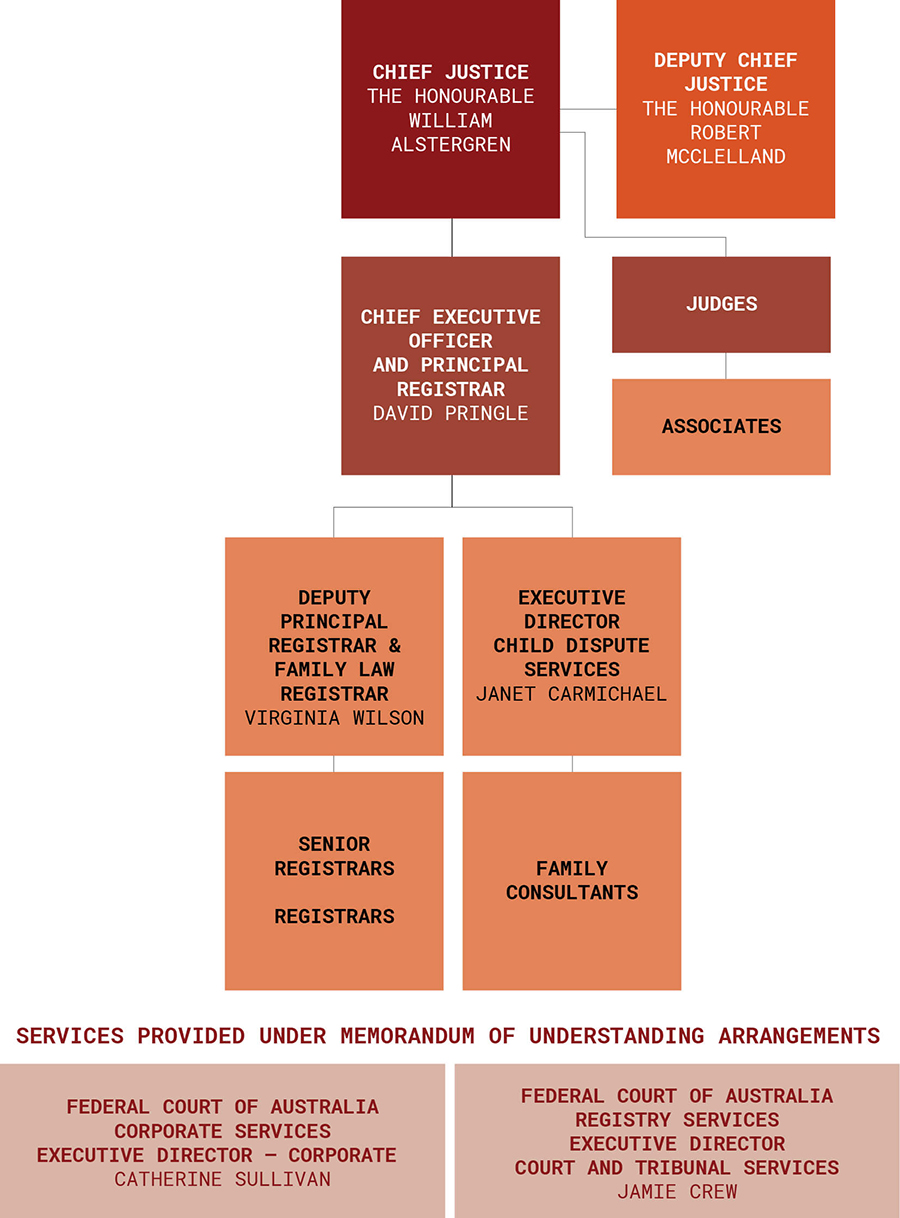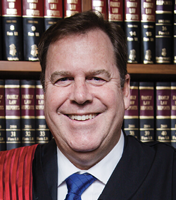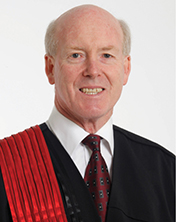About the Court
The Family Court of Australia (Family Court) is a superior Court of record established by Parliament in 1975 under Chapter III of the Constitution. The Court operates under the Family Law Act 1975 (Cth) and, through its specialist judges and staff, helps Australians to resolve their most complex family disputes.
Purpose
As outlined in the Corporate Plan, the purpose of the Family Court, as Australia’s superior Court in family law, is to help Australians resolve their most complex family disputes by deciding matters according to the law, promptly, courteously and effectively.
Outcome and program
From 1 July 2016, the Family Court and the Federal Circuit Court, together with the Federal Court of Australia were designated a single administrative entity under the Public Governance, Performance and Accountability Act 2013 and a single statutory agency under the Public Service Act 1999; with shared corporate services.
The Courts Administration Legislation Amendment Act 2016 established the single administrative entity, known as the Federal Court of Australia. This approach preserves the Courts’ functional and judicial independence while improving their financial sustainability.
Outcome 2
The outcome of the Court is to apply and uphold the rule of law for litigants in the Family Court through the resolution of family law matters according to law, particularly more complex family law matters, and through the effective management of the administrative affairs of the Court.
Program 2.1
The Family Court has a single program under which all services are provided: Family Court of Australia.
Performance criteria
- Clearance rate of 100 per cent
- 75 per cent of judgments to be delivered within three months, and
- 75 per cent of cases pending conclusion to be less than 12 months old.
Details of the Court’s performance in 2019–20 can be found in Part 3 (Report on Court performance) on page 16. The Court’s annual performance statement can be found in the Federal Court’s 2019–20 annual report.
Jurisdiction
The Family Court exercises original and appellate jurisdiction in family law, including in a number of highly specialised areas.
At first instance, the Court determines cases with the most complex law, facts and parties, and hears cases arising under the regulations implementing the Hague Convention on the Civil Aspects of International Child Abduction.
It provides national coverage as the appellate court in family law matters, including hearing appeals from decisions of single judges of the Court and from judges of the Federal Circuit Court in family law matters and from the Family Court of Western Australia.
The Family Court has jurisdiction under all aspects of the Family Law Act 1975 (Cth). The types of cases the Family Court deals with include:
- Parenting cases involving a child welfare agency and/or allegations of sexual abuse or serious physical abuse of a child (Magellan cases); family violence and/or mental health issues with other complexities; multiple parties; cases where orders sought would have the effect of preventing a parent from communicating with or spending time with a child; multiple expert witnesses; complex questions of law and/or special jurisdictional issues; international child abduction under the Hague Convention; special medical procedures; and/or international relocation.
- Financial cases that involve multiple parties, valuation of complex interests in trust or corporate structures, including minority interests, multiple expert witnesses, complex questions of law and/or jurisdictional issues or complex issues concerning superannuation.
The Court also has original jurisdiction under certain Commonwealth Acts, including:
- Marriage Act 1961
- Child Support (Registration and Collection) Act 1988
- Child Support (Assessment) Act 1989, and
- Bankruptcy Act 1966.
Changes to the Court’s jurisdiction in 2019–20
There were no changes to the Court’s jurisdiction in 2019–20.
Organisational chart

Judicial officers
At 30 June 2020, there were 33 judicial positions in the Court, including the Chief Justice and Deputy Chief Justice.

Chief Justice
The Chief Justice is responsible for ensuring the effective, orderly and expeditious discharge of the business of the Court (section 21B Family Law Act 1975 (Cth)) and for managing its administrative affairs (s 38A). The Chief Justice is assisted in judicial responsibilities by the Deputy Chief Justice (s 21B) and in administrative responsibilities by the CEO and Principal Registrar (s 38B). The Chief Justice’s chambers are located in the Melbourne registry. The Honourable William Alstergren was appointed Chief Justice of the Family Court on 10 December 2018.

Deputy Chief Justice
The Deputy Chief Justice assists the Chief Justice in the judicial administration of the Court. Particular responsibilities include case management, complaints about judges, the collection and strategic assessment of statistics, pastoral care and oversight of the Court’s committees. In the absence of the Chief Justice, the Deputy Chief Justice performs and exercises the powers of the Chief Justice (s 24). The Honourable Robert McClelland was appointed as Deputy Chief Justice on 10 December 2018.
Judges assigned to the Appeal Division – 30 June 2020
| Judge | Appointed to the Appeal Division |
|---|---|
|
The Honourable Chief Justice William Alstergren |
10 December 2018 |
|
The Honourable Deputy Chief Justice Robert McClelland |
10 December 2018 |
|
The Honourable Justice Steven Andrew Strickland |
14 December 2009 |
|
The Honourable Justice Ann Margaret Ainslie-Wallace |
9 July 2010 |
|
The Honourable Justice Judith Maureen Ryan |
27 September 2012 |
|
The Honourable Justice Murray Robert Aldridge |
12 March 2015 |
|
The Honourable Justice Michael Patrick Kent |
10 December 2015 |
|
The Honourable Justice Garry Allan Watts |
21 June 2018 |
|
The Honourable Justice Stewart Craig Austin |
21 June 2018 |
|
The Honourable Justice Peter William Tree |
22 March 2019 |
Family Court of Australia Judges – 30 June 2020
| Judge | Appointed |
|---|---|
| Adelaide | |
|
The Honourable Justice Steven Andrew Strickland |
22 November 1999 |
|
The Honourable Justice David Michael Berman |
18 July 2013 |
|
The Honourable Justice Christine Mead |
25 March 2019 |
| Brisbane | Appointed |
|
The Honourable Justice Colin James Forrest |
1 February 2011 |
|
The Honourable Justice Michael Patrick Kent |
12 July 2011 |
|
The Honourable Justice Jenny Deyell Hogan |
14 January 2013 |
|
The Honourable Justice Catherine Carew |
7 March 2016 |
|
The Honourable Justice Michael Baumann AM |
11 January 2018 |
| Canberra | Appointed |
|
The Honourable Justice Shane Leslie Gill |
16 May 2016 |
| Hobart | Appointed |
|
The Honourable Justice Robert James Charles Benjamin AM |
19 August 2005 |
| Melbourne | Appointed |
|
The Honourable Chief Justice William Alstergren |
13 October 2017 |
|
The Honourable Justice Victoria Jane Bennett AO |
30 November 2005 |
|
The Honourable Justice Kirsty Marion Macmillan |
14 December 2011 |
|
The Honourable Justice Sharon Louise Johns |
29 July 2013 |
|
The Honourable Justice Jillian Williams |
8 February 2019 |
|
The Honourable Justice Joshua Wilson |
11 March 2019 |
|
The Honourable Justice Norah Hartnett |
25 March 2019 |
|
The Honourable Justice Timothy McEvoy |
27 March 2019 |
| Newcastle | Appointed |
|
The Honourable Justice Stewart Craig Austin |
13 July 2009 |
|
The Honourable Justice Margaret Ann Cleary |
8 July 2010 |
| Parramatta | Appointed |
|
The Honourable Justice Garry Frederick Foster |
8 August 2013 |
|
The Honourable Justice Hilary Rae Hannam |
13 August 2013 |
| Sydney | Appointed |
|
The Honourable Deputy Chief Justice Robert Bruce McClelland |
16 June 2015 |
|
The Honourable Justice Ann Margaret Ainslie-Wallace |
9 July 2010 |
|
The Honourable Justice Judith Maureen Ryan |
31 July 2006 |
|
The Honourable Justice Murray Robert Aldridge |
13 December 2012 |
|
The Honourable Justice Janine Patricia Hazelwood Stevenson |
18 May 2001 |
|
The Honourable Justice Garry Allan Watts |
14 April 2005 |
|
The Honourable Justice Ian James Loughnan |
12 July 2010 |
|
The Honourable Justice Judith Anne Rees |
15 December 2011 |
|
The Honourable Justice Louise Henderson |
8 February 2019 |
|
The Honourable Justice Robert Harper |
11 March 2019 |
| Townsville | Appointed |
|
The Honourable Justice Peter William Tree |
14 January 2013 |
Family Court of Western Australia
The following judges of the Family Court of Western Australia also hold commissions in the Family Court of Australia.
| Judge | Date of Family Court commission |
|---|---|
|
Chief Judge The Honourable Justice Gail Sutherland |
16 March 2018 |
|
The Honourable Justice Simon Moncrieff |
31 August 2009 |
|
The Honourable Justice Susan Janet Duncanson |
6 December 2012 |
|
The Honourable Justice Richard O’Brien |
12 April 2016 |
|
The Honourable Justice Ciara Tyson |
22 February 2019 |
Judges appointed to the Administrative Appeals Tribunal
- The Honourable Justice Janine Stevenson
- The Honourable Justice Victoria Bennett AO
- The Honourable Justice David Berman
- The Honourable Justice Robert James Charles Benjamin AM
- The Honourable Timothy McEvoy
Judicial appointments
There were no judicial appointments in 2019–20.
Judicial retirements

There was one judicial retirement in 2019–20. Justice Johnston retired on 4 September 2019.
Court service locations
Judges and registrars of the Court are located at the following registries:
- Adelaide
- Brisbane
- Canberra
- Hobart
- Melbourne
- Newcastle
- Parramatta
- Sydney, and
- Townsville.